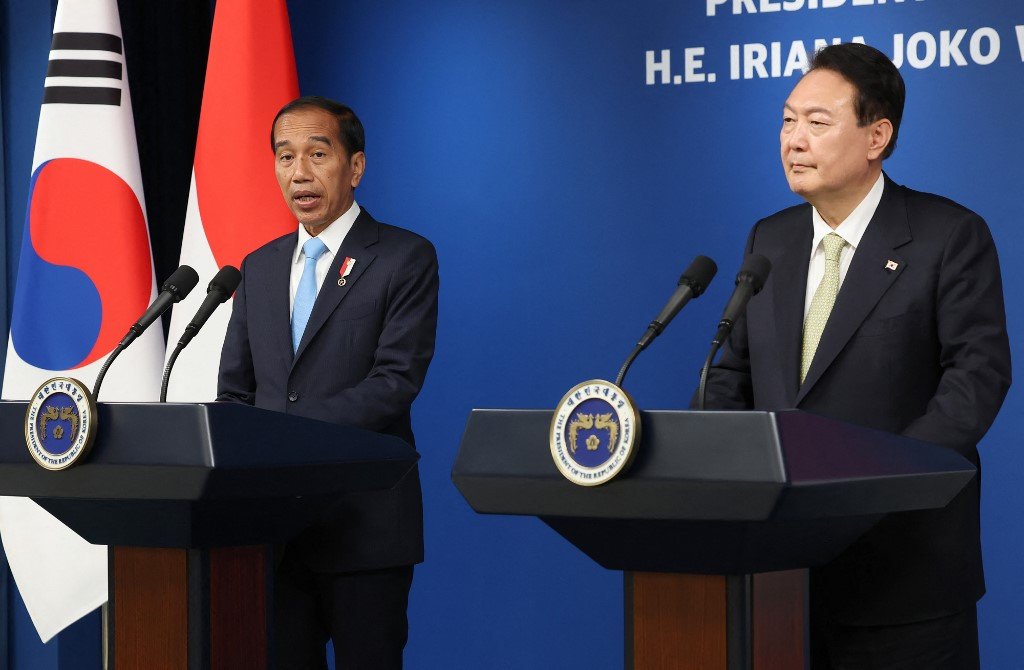
Global investors in Asian bonds are positioning themselves to benefit from potential U.S. dollar weakness, pouring funds into countries like Indonesia and South Korea where currencies are expected to appreciate while remaining cautious about China during its sluggish recovery.
Foreign investors increased their holdings in “emerging” Asian bond markets outside China by $20.2 billion in the first half of 2023, the highest half-yearly figure in two years, according to a report by the Australia and New Zealand Banking Group (ANZ)
South Korean and Indonesian bonds emerged as favorites among overseas investors, attracting inflows of $8.2 billion and $4.4 billion, respectively, during the first five months of the year, ANZ data shows. That compares with an outflow of $29.6 billion from China in the same period.
Jean-Charles Sambor, head of emerging market fixed income at BNP Paribas Asset Management, said bonds in countries such as South Korea and Indonesia were benefiting from investors “betting on the end of dollar strength” as the U.S. Federal Reserve nears the conclusion of its rate-hiking cycle.
“For the first time, we should see the Asian currencies appreciating against the U.S. dollar and it should help foreigners looking at opportunities in Asian local currency debt markets,” Sambor said. “It’s a real game changer.”
Nigel Foo, Singapore-based head of Asian fixed income at First Sentier Investors, a leading Asian bond investor, said the looming shift in Fed policy came at a good time for Asian economies where central banks have brought inflationary pressures under control and are poised to cut rates to boost growth.
“What this means for local currency bonds, you get a bond yield for about 3% to 4% [and] on top of that you add another 3% of currency gains. That would be like a 7% return,” he said.
Foo said his fund owns bonds in South Korea’s Hyundai Motors and has been looking at other issuers from the nation, as well as “sovereign and quasi-sovereign” opportunities such as Indonesian government-backed oil company Perusahaan Listrik Negara (PLN).
“We do like Indonesia a lot,” Foo said, citing “deep enough liquidity” and a relatively stable political environment.
Year-to-date, bonds issued by PLN, Hyundai, Export-Import Bank of Korea, Taiwanese chipmaker TSMC and Malaysian oil company Petronas are among the most actively traded names on MarketAxess, a Nasdaq-listed trading platform for fixed income.
Chinese bonds are finding less favor because of concerns that the yuan has further to fall, uncertainty about whether significant economic stimulus measures will be unveiled in Beijing and ongoing geopolitical tensions between China and the U.S., said Robert Hong, Singapore-based head of Asia-Pacific fixed income at StoneX, a financial services company.
“I think that [political tension] is a big factor that is still keeping the big international funds from coming back en masse into China markets, be it bonds or equities,” Hong said.
Caution about Chinese bonds is widespread among fund managers. A Morningstar study based on data through May found a broad decline in Chinese exposure this year at 179 bond funds with $54.2 billion in assets that are managed by the likes of BlackRock, Pimco, Fidelity, HSBC and UBS. BlackRock’s $3 billion Asian Tiger Bond Fund cut its exposure to China from 38.89% in January to 33.42% in May.
“China’s slower-than-expected recovery in its economy and its property sector contribute to the cautious stance of the major Asian bond managers toward the country,” said Bryan Cheung, associate director of manager research at the fund rating agency.
Sambor said BNP Paribas Asset Management’s emerging market fixed-income managers have reduced their exposure to Chinese fixed-income investments in recent months as the Chinese yuan — also known as the renminbi, or RMB — has lost value against the U.S. dollar.
“Last year, we were super positive on Chinese local currency debt,” he said. “We are not negative on the renminbi, but I think to see some inflows back to China local currency debt, we need to see some stabilization in the RMB first.”
Foo said China’s currency was unlikely to benefit from U.S. interest rate reductions as long as its economy struggles.
First Sentier’s Asian Quality Bond Fund, which manages $1.57 billion, has been underweight China for two years, Foo said. China currently accounts for 30% of its holdings, compared with the country’s 40% weighting in JPMorgan’s Asia Credit Index, the fund’s benchmark.
“It’s not that we are bearish on China, but it’s more because we think diversification is always good,” Foo said.
In China’s fixed-income market, investors are targeting debt in state-backed companies, which are seen as more likely to pay back debts, or tech companies with solid cash flows and earnings outlooks, executives at Standard Chartered and First Sentier said.
“We are still cautious on China high-yield bonds,” said Lloyd Chan, senior investment strategist at Standard Chartered.
Less risky fixed-income investments in China also stand to benefit from comparisons with Chinese equities as hopes for a Chinese reopening boom fade and consumer confidence remains weak.
“While people are a bit cautious today, I think it’s much easier to bring back investors in the fixed-income space, than on the equity side,” Bhaskar Laxminarayan, chief investment officer for Asia at private bank Julius Baer, said at an outlook conference in Hong Kong in early July.
Mark Matthews, head of Asia research at Julius Baer, added: “As cheap as stocks are, we don’t have the confidence to recommend them to people yet.”

